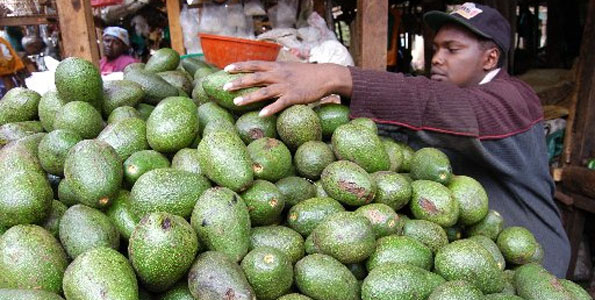 A meteoric rise in Kenya’s health conscious middle class, a growing appetite for fresh produce by hotels, expanding export market and changing lifestyles have conspired to work in favour of farmers, with demand for certain crops enjoying unprecedented uptake in 2014, a trend expected to roll over to 2015.
A meteoric rise in Kenya’s health conscious middle class, a growing appetite for fresh produce by hotels, expanding export market and changing lifestyles have conspired to work in favour of farmers, with demand for certain crops enjoying unprecedented uptake in 2014, a trend expected to roll over to 2015.
Market research by Farmbizafrica through talking to hotels, consumers, exporters, and supermarkets reveals these are the crops that will be in high demand in 2015.
Vegetables
Hotels and supermarkets have recorded astronomical demand for vegetables like kale, spinach, cabbages, and African Idigenious vegetables, AIVs (terere, murenda etc). This has in part been driven by a health conscious customers who are willing to part with anything to get fresh quality veggies.
A spot check by farmbizafrica revealed that no veggies delivered in supermarkets lasted more than a day in the shelves. A kilo of spinach for example that retailed at Sh70 in many supermarkets in Nairobi last December are now up to Sh80 in January. “And even with the Sh10 increase there is still unprecedented demand from customers that we cant meet. Farmers are not delivering enough,” said Tim Kimani sales Manager at Tepei Supermarket Nairobi.
Tomatoes
Hailed as one of the most used commodities in any kitchen, tomatoes is perhaps the only crop that recorded stellar price rise in 2014, with all indications pointing to an even higher price this year as imports fall. With one tomato going for Sh10 in small estate markets, the demand was still insatiable. Big hotels like Artcaffe now buying directly from smallholder farmers have expressed pent up demand for tomatoes which they buy from farmers for as much as Sh 140 per kilo. However to be a supplier a farmer must demonstrate consistency of supply. And with the catastrophic Tuta absoluta disease now under control, the market prospects of tomatoes are very promising this year.
Flowers
As Kenya moves to new flower export markets like Russia and with Pakistan, and with flower buyers bypassing traditional auctions and meeting flowers growers directly through the annual International Flower Trade Exhibition (IFTEX), smallholder farmers are joining the flower growing wagon with impressive results.
Last year over 10,000 new smallholder farmers delved into flower farming according to records with majority finding markets locally. “These days you don’t even have to export. The local demand is so high that we can keep up,” said Dorothy Mueni one of the farmers who delved into flower business last year.
Tuberose which is among the common flowers grown by smallholder farmers due to ease of maintenance fetches Sh5 a stem. Mueni flowers sit on an acre where she harvests 5,000 stems per week earning her upto Sh120,000 during peak periods.
Flower companies like the Thika based Wilmar Flowers export flowers to the Netherlands and have contracted small holders like Mueni for supplies. They pay weekly. Local flower companies and EPZ companies are also training farmers how to preserve flowers and foliage with the company turning the raw foliage into decorative masterpieces like dramatic pillars, huge balls, lamp shades, candle stands and even chandeliers, for overseas markets.
Hass Avocado
Kenyan smallholder farmers have been on a roller coaster as international and recently local markets express pent up demand for Kenyan avocadoes. Kenya has traditionally grown two avocado varieties, the Hass and Fuerte. Traditionally, the bulk of avocado trees have been Fuerte but market trends that favour Hass, a warty, medium sized, roundish fruit that turns purple at full maturity, has a tough, pebbly skin, with an impressive shelf life.
Fuerte, on the other hand is a Mexican-Guatemalan hybrid is a shiny-green, pear-shaped fruit that weighs 250 to 450 g. Contract farming with organizations like Olivado Kenya (EPZ) Ltd, an avocado processing company from New Zealand that four years ago established its East African base in Nairobi to buy fruit from farmers for processing into oil is offering farmers a ready and competitive market. While the farm gate price is Sh5, these organizations are enticing farmers with as much as Sh10 per avocado.
Strawberry leaves
Even as more farmers move into strawberries buoyed by the promise of growing demand for the fruit, strawberry leaves though ignored by farmers are another way of making quick money. Florists and decorating companies are courting strawberry leaves as a key component in making bouquet due to its shape and smell.
A single branch of the plant goes for Sh1.50, with farmers tying them in bundles of 100 branches that sell for Sh150 each. Mbari ya Mboche farmers group in Kandara which is the pioneer farmer group in sale of strawberry leaves has raked a fortune from the venture. The demand for bouquets, which was traditionally limited to offices, churches and events, has now moved to individuals, with demand for the flowers for home decorations growing ten fold in the recent past offering strawberry farmers a gold mine this year.
Farmers interested in tapping into these crops are advised to carry due diligence on the markets that suit them and their capacity to produce.
















Comments powered by CComment